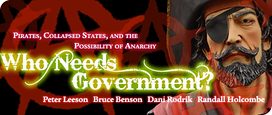One interesting thing about this entire exchange is that it was nominally organized as a discussion about anarchy, proclaiming “anarchy unbound,” and yet from the beginning anarchy has had little to do with the discussion. Leeson’s opening essay discussed actual stateless situations in a few poor countries, and Dani Rodrik responded by noting, “There is no example of a society that has become prosperous without a state machinery.”
The discussion following that revolved around how cooperative institutions can arise without government, and the role of government in the facilitation of international trade. As Rodrik noted in his most recent comment, he and Leeson don’t disagree on many specific points, but where does anarchy fit into all this?
Rodrik posed some interesting questions about policy recommendations in his last post. Let me throw in a few, too.
Pete, do you think that if Somalia remains in its stateless condition that it will emerge from poverty to prosperity? Do you think there is any practical way to eliminate governments in those areas that have bad governments, and actually leave them stateless? Governments are toppled all the time, but the bad governments that are toppled often are replaced by governments that are even worse.
And, with reference to anarchy we have been talking about poor countries with bad governments. If you had the option of completely eliminating government in the United States, relying entirely on voluntary agreements, would you do it? We live a pretty good life right now, so it would be a gamble, especially if my conjecture that anarchy is not a stable equilibrium has any merit.
The difficult thing about contemplating orderly anarchy in a prosperous society is that it is so far away from anything ever experienced. Economists are used to thinking about changes at the margin, and while a change from a bad government in a poor country to anarchy isn’t too big a change, the orderly anarchy that some libertarian anarchists have advocated is far from a marginal change. What do you think, Pete?

